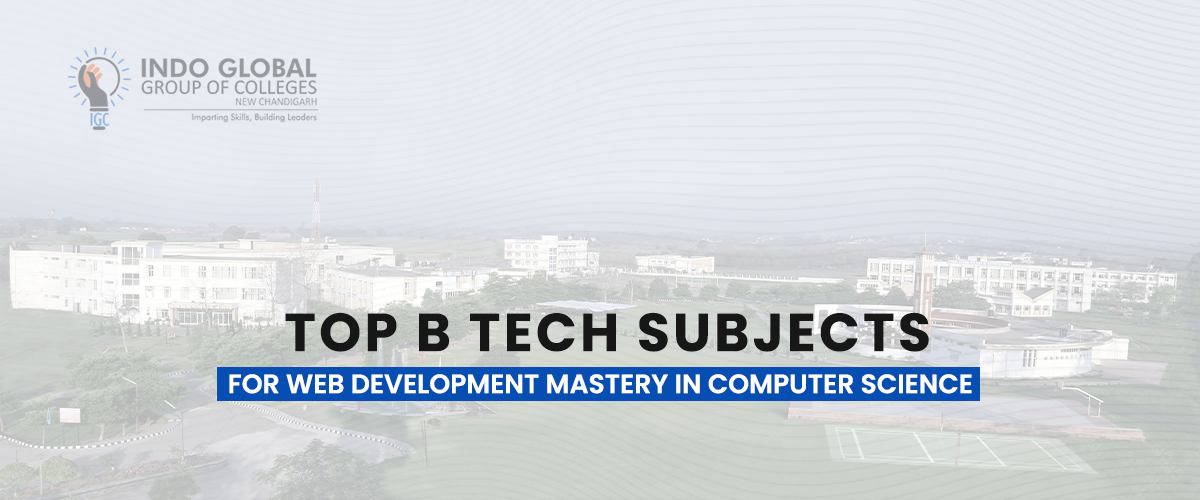Introduction:
In the rapidly evolving world of technology, pursuing a Bachelor of Technology (B.Tech) in Computer Science and Engineering is a gateway to a myriad of exciting career opportunities. This comprehensive program is designed to equip students with the knowledge and skills necessary to navigate the complex and ever-changing realm of computer science. In this article, we delve into the diverse array of B.Tech subjects in Computer Science, exploring the core concepts, practical applications, and the dynamic nature of the curriculum.
Foundational Subjects:
The foundation of any B.Tech program lies in its core subjects, forming the building blocks of a student’s technical expertise. In the realm of b.tech computer science and engineering subjects, these foundational subjects cover essential areas such as programming, algorithms, and data structures. Programming languages like C, C++, and Java are often introduced to provide students with a strong coding base. The study of algorithms and data structures lays the groundwork for efficient problem-solving and optimization, crucial skills in the field.
Software Engineering and Development:
A significant portion of the curriculum is dedicated to software engineering and development. This encompasses subjects like Software Engineering, where students learn about the entire software development lifecycle, including requirements analysis, design, implementation, testing, and maintenance. Database Management Systems (DBMS) is another critical subject, focusing on the storage, retrieval, and management of data – a fundamental aspect of modern software applications.
Operating Systems and Computer Architecture:
Understanding the core components of computers is essential for a Computer Science and Engineering student. Subjects like Operating Systems delve into the intricacies of system software, process management, memory management, and file systems. Computer Architecture introduces students to the design and organization of computer systems, providing insights into the underlying hardware architecture that powers software applications.
Networking and Communication:
In an interconnected world, networking and communication play a pivotal role in the field of Computer Science and Engineering. Students study subjects like Computer Networks, where they explore the principles of data communication, network protocols, and network security. This knowledge is crucial for developing applications that operate seamlessly in distributed environments and ensuring the integrity and confidentiality of data during transmission.
Artificial Intelligence and Machine Learning:
The rapid advancements in artificial intelligence (AI) and machine learning (ML) have reshaped the technological landscape. B.Tech programs in Computer Science and Engineering often include subjects dedicated to these cutting-edge technologies. Students delve into the principles of AI, understanding concepts like machine learning algorithms, natural language processing, and computer vision. Practical applications of AI and ML, such as developing intelligent systems and predictive models, are explored in-depth.
Cybersecurity:
As digital threats continue to evolve, the importance of cybersecurity cannot be overstated. B.Tech programs in Computer Science and Engineering integrate subjects like Cybersecurity, where students learn to identify vulnerabilities, implement security measures, and safeguard information systems. Ethical hacking and cryptography are often covered, empowering students to contribute to the ongoing battle against cyber threats.
Mobile Computing and Application Development:
With the widespread use of smartphones and tablets, mobile computing has become a focal point of study. B.Tech subjects in Computer Science and Engineering often include courses on mobile application development, where students learn to create innovative and user-friendly mobile apps. This involves understanding mobile operating systems, development frameworks, and user interface design principles.
Internet of Things (IoT) and Embedded Systems:
The Internet of Things (IoT) has transformed the way we interact with the world around us. Subjects related to IoT and Embedded Systems provide students with insights into connecting devices, collecting and analyzing data, and creating intelligent systems. This area of study prepares students for the challenges and opportunities presented by the increasing interconnectivity of everyday objects.
Cloud Computing:
As businesses migrate towards cloud-based solutions, understanding cloud computing becomes crucial for Computer Science and Engineering students. Subjects in this domain cover cloud architecture, services, and deployment models. Students learn to design and implement scalable and reliable applications that leverage the power of cloud platforms.
Conclusion:
A B.Tech in Computer Science and Engineering offers a rich and diverse curriculum that reflects the dynamic nature of the field. From foundational subjects to emerging technologies like AI, cybersecurity, and IoT, students are exposed to a comprehensive range of concepts and skills. This holistic approach ensures that graduates are well-equipped to tackle real-world challenges and contribute meaningfully to the ever-evolving world of computer science. As technology continues to advance, the relevance and importance of B.Tech subjects in Computer Science and Engineering remain paramount, shaping the future of innovation and technological progress.

